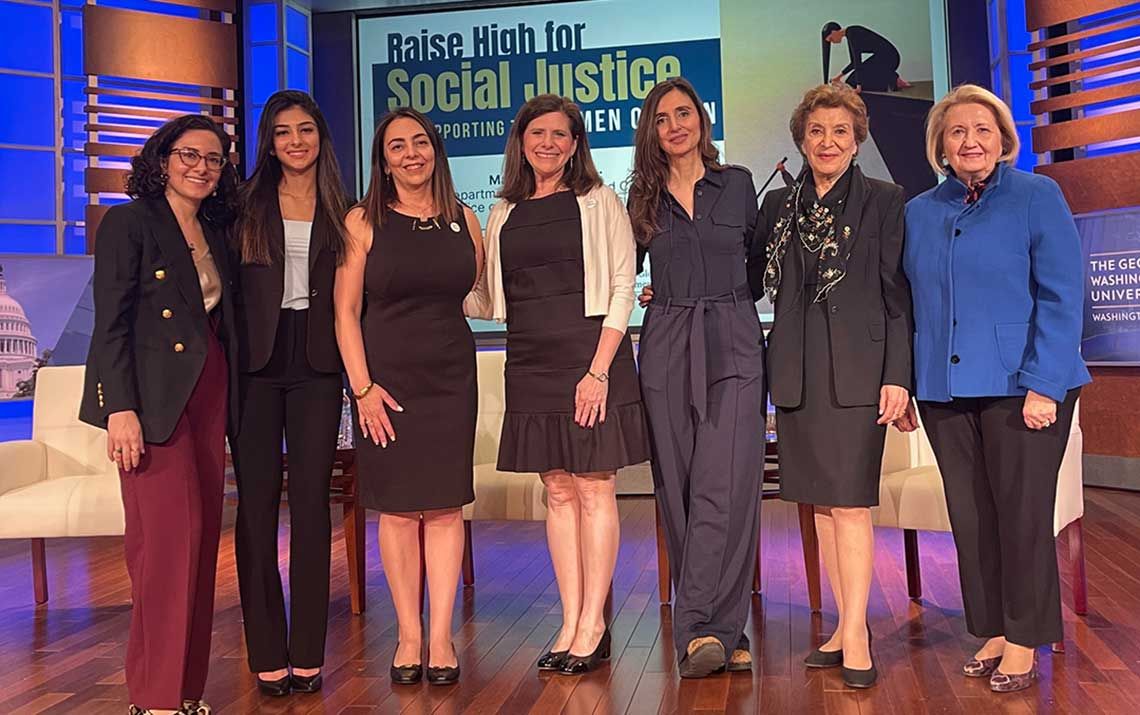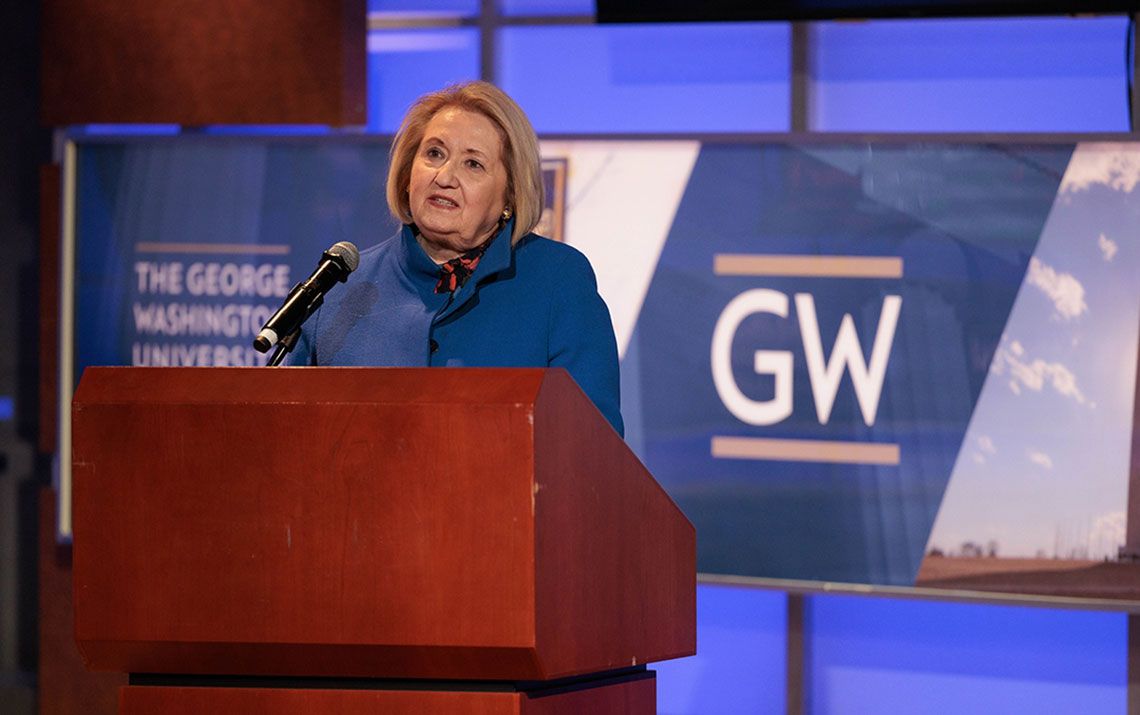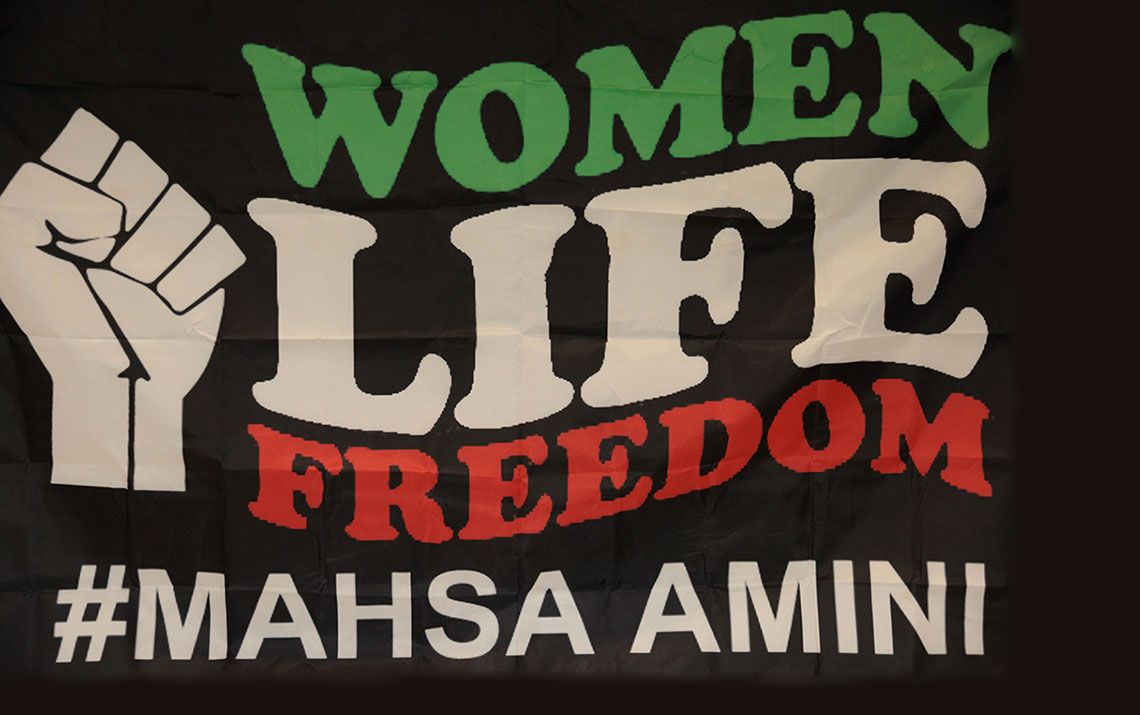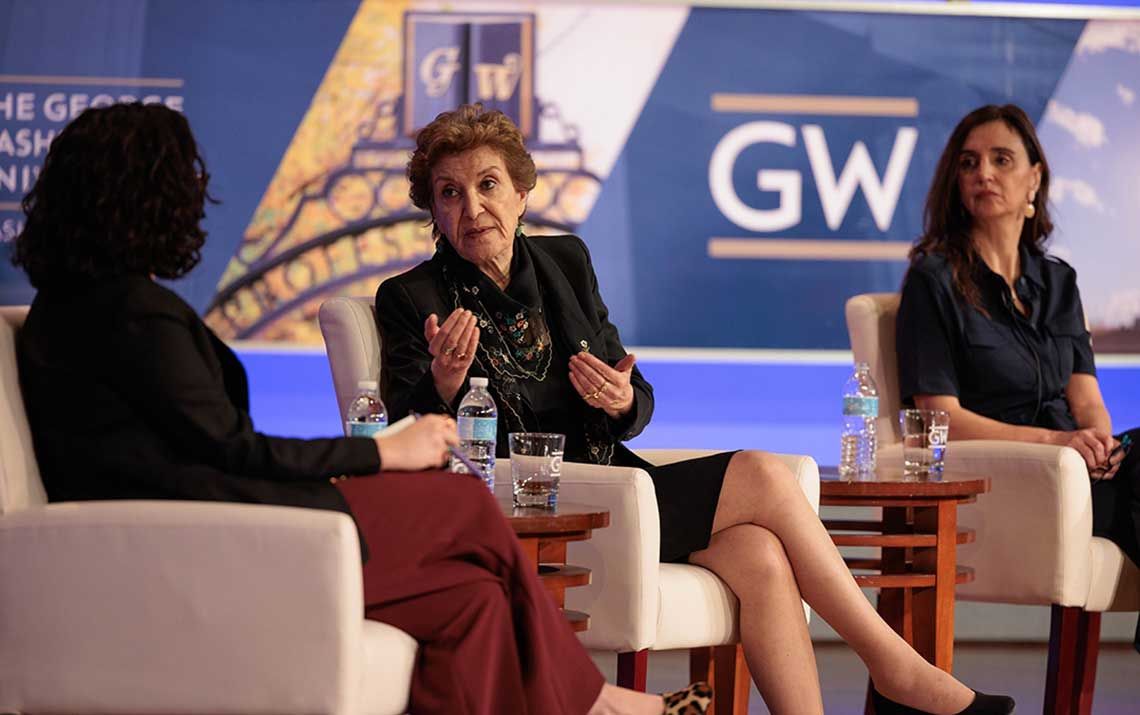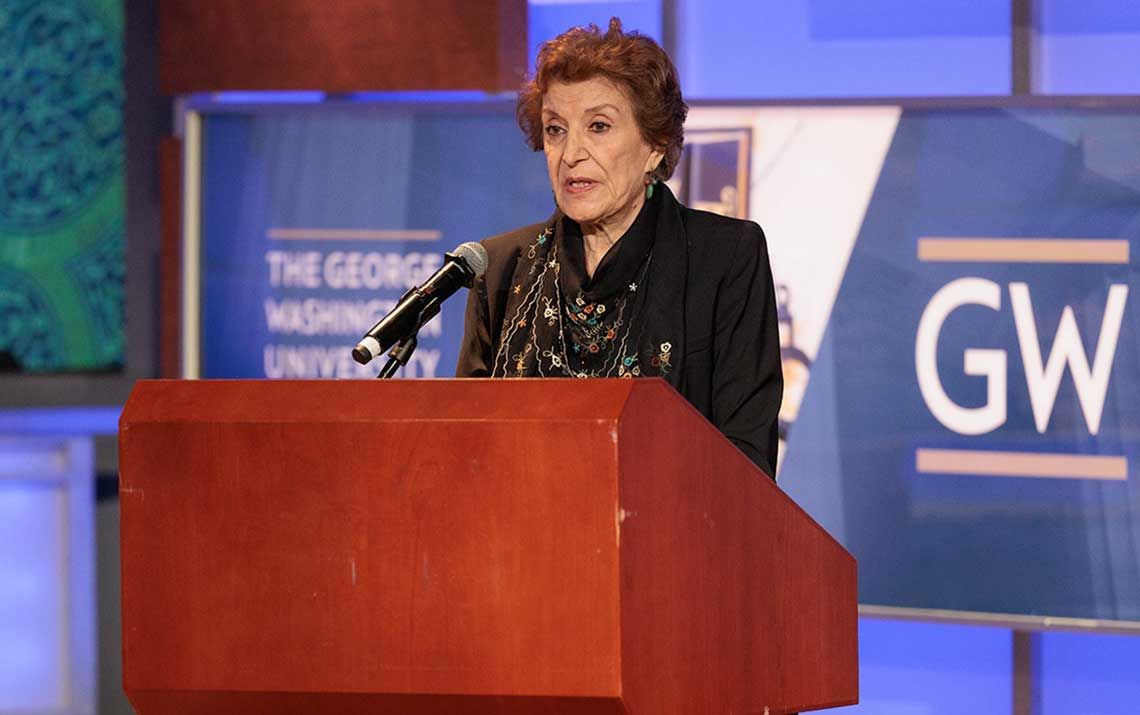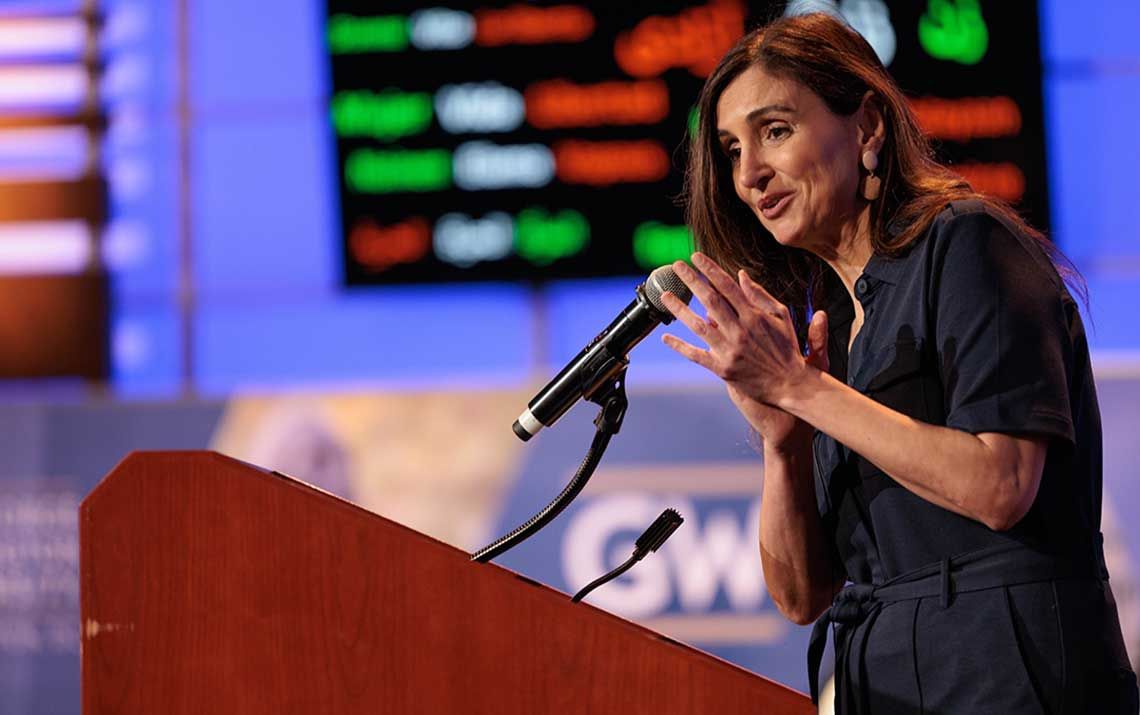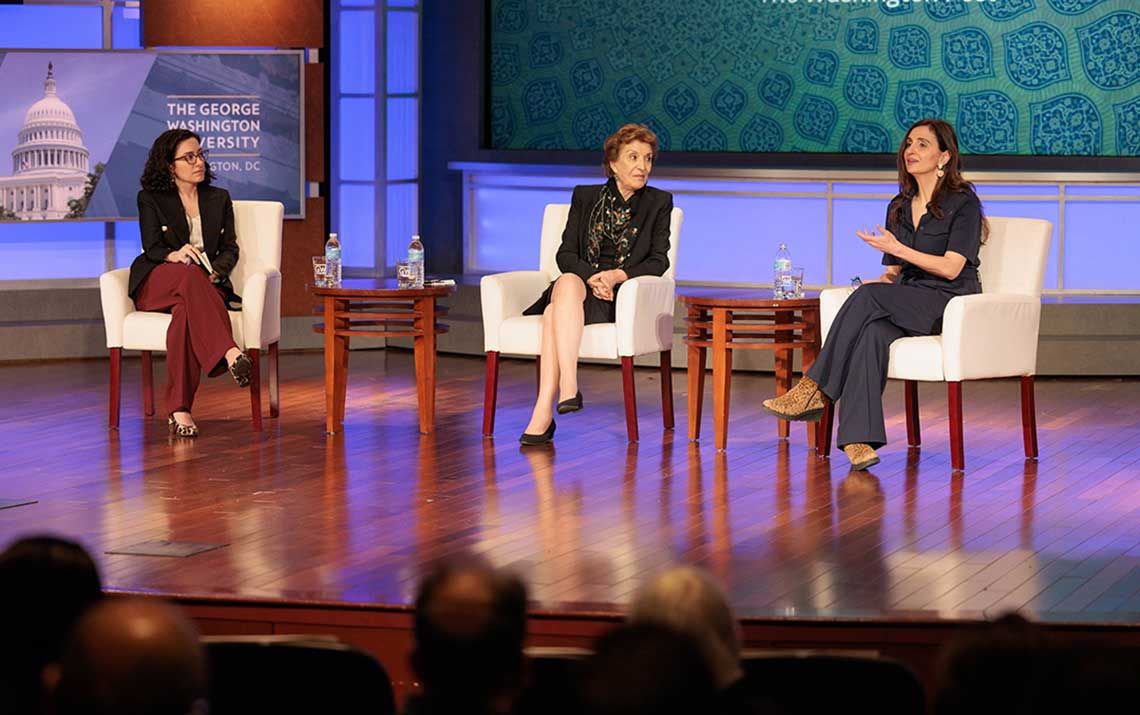The George Washington University (GW) community turned out in person and online for “Raise High for Social Justice: GW Supporting the Women of Iran,” a discussion of the roles that women have played and continue to play in the evolution of that country.
The event was sponsored by the Iranian Student Association, the GW Global Women’s Institute, and the GW School of Medicine and Health Sciences (SMHS) Clara Bliss Hinds Society, and organized by Ahdeah Pajoohesh-Ganji, PhD, associate professor of anatomy and cell biology at GW SMHS; and Lisa Schwartz, EdD ’10, associate professor of biomedical laboratory sciences at GW SMHS and a leader with the Clara Bliss Hinds Society. It featured remarks from noted women’s rights activists Mahnaz Afkhami, Iranian former minister of women’s affairs in pre-1979 Revolution Iran; Roya Hakakian, a Jewish Iranian-American journalist, lecturer and writer; and Melanne Verveer, executive director of the Georgetown Institute for Women, Peace and Security and former U.S. ambassador for global women’s issues.
Yasameen Ganji, a junior in the School of Business and the treasurer for the Iranian Student Association, opened the event in late March with a statement on behalf of the Iranian students at GW.
Reflecting on the more than four decades since the Islamic Republic of Iran took power, she said, “[Iranians,] especially Iranian women, have been denied the basic freedoms of a normal life. They have been denied basic human rights that many take for granted in the United States.
“During the last six months, the chants of ‘zan zendegi azadi’ (زنان), which translates to ‘women, life, freedom,’ have emerged from Iran and been echoed around the world to portray the demand for basic human rights and social justice, not only for women, but for every man and child who dares to dream of a free life.”
On Sept. 16, 2022, Mahsa Jina Amini, a 22-year-old Iranian Kurdish woman, allegedly suffered a heart attack while in police custody. She had been arrested by the Guidance Patrol and later transferred to the Moral Security for alleged Islamic dress code violations. Her death sparked widespread protests across Iran and prompted the government to levy harsh reprisals on the protestors. By January, according to the non-governmental organization Iran Human Rights, nearly 500 women, men, and children had been killed during the protests, and the Iranian government acknowledged that “tens of thousands” of others had been detained.
“I have been reflecting on these messages and the calls for freedom of expression, freedom of political protest and equal rights for women,” said GW President Mark S. Wrighton, PhD, during the GW event.
From the moment the protests and violence against protestors began, Wrighton said he had been beseeched by students, faculty, staff and others personally affected by the events in Iran.
“These are among the important values of our university,” he said, “and they are critical to fulfilling our academic mission by encouraging rigorous discourse and action—and ensuring all have equal opportunity to succeed.”
As she took the stage, Afkhami, who played a key role in the passage of progressive amendments in 1975 to the Iranian Family Lawand helped establish the United Nations Asia-Pacific Center for Women Development in Exile, noted that the previous day was the Persian New Year, Nowruz. The annual celebration of renewal, she said, reminded her of a time when Iran was known as the Land of Roses and Nightingales. “Then came a time that we started being called something not so nice, the Axis of Evil,” she said. “Now, thanks to the courage and commitment of the women of Iran, the world may see the true image of Iran.”
What the Iranian revolutionary women have done, she said, “will be a deciding factor in how Iran will turn out. Not only that, but it will have a deciding impact on what the world of women and, as a result, the world of men across the world will experience.”
The movement, she added, has chosen “wise slogans and ideals that are doable, that appeal to anybody. There [is] no set of demonstrations or a revolutionary movement that has had the kind of reception that this movement does. It is completely unknown in global history.”
Previous uprisings, such as the Green Revolution, the 2011 Day of Rage and the 2016 Cyrus the Great Revolt, failed to achieve their aims, Hakakian noted. So, what sets the women’s revolutionary movement apart?
“This one is different,” she said, “because the conversation between the nation and its leadership has ended. The people … aren’t asking the government for anything. They’re not making any demands from the regime other than for it to go away.”
Ambassador Verveer closed out the slate of speakers, offering a means to support the democracy movement. She called for university communities to issue statements of solidarity and support Iranian scholars at risk. She suggested organizing petition drives calling on the regime to end its brutality against the protesters.
“Years ago,” she recalled, “I had the good fortune to meet President Nelson Mandela of South Africa, and we were at the prison where he had spent so much of his life fighting against apartheid. I asked him at one point, ‘President Mandela, did you know we were protesting in different parts of the world? Did you know we had boycotts?’ And he paused, and he looked at me, and he said, ‘What do you think kept us going?’ ”
